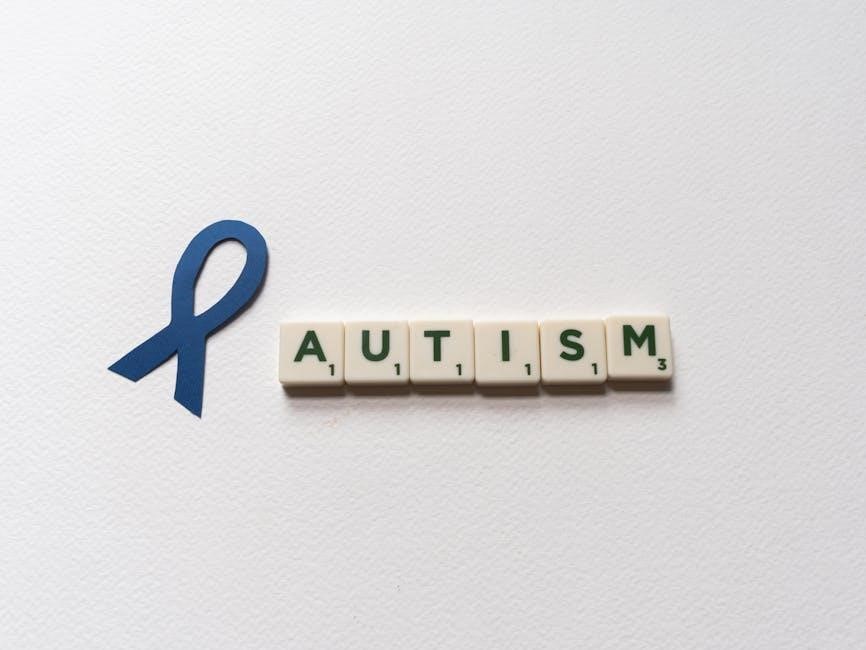The 12th edition of Understanding Abnormal Behavior by David Sue and Derald Wing Sue offers a comprehensive exploration of psychopathology, blending theories, research, and real-world applications․ With a strong emphasis on multicultural perspectives, this edition provides an engaging narrative that fosters deeper understanding of mental health challenges․ Its balanced approach and accessible format make it an essential resource for students and professionals alike․ The textbook is widely available in digital formats, including PDF, ensuring easy access for learners worldwide․
Overview of the Textbook
Understanding Abnormal Behavior, 12th Edition, by David Sue and Derald Wing Sue, provides a comprehensive overview of psychopathology, emphasizing both theoretical foundations and practical applications․ The textbook integrates biological, psychological, and sociocultural perspectives, offering a balanced understanding of mental health challenges․ It features engaging visuals, real-world examples, and a multicultural focus, making it accessible and relevant for students․ Available in digital formats, including PDF, it supports flexible learning and academic success․
Importance of Studying Abnormal Behavior
Studying abnormal behavior is crucial for understanding mental health challenges and developing effective interventions․ It enables students to grasp the complexities of psychopathology, fostering empathy and reducing stigma․ By examining diverse perspectives, learners gain a holistic view of mental disorders, preparing them for careers in psychology and related fields․ The 12th edition of Understanding Abnormal Behavior provides insights into these topics, enhancing both academic and professional development․
Structure and Organization of the 12th Edition
The 12th edition of Understanding Abnormal Behavior is organized into clear, logical chapters, each focusing on specific aspects of mental health․ The textbook begins with foundational theories and progresses to detailed explorations of disorders, treatments, and cultural influences․ Visual aids, case studies, and interactive tools like MindTap enhance learning․ This structured approach ensures a comprehensive understanding of abnormal psychology, making it accessible for students at all levels․
Theoretical Foundations of Abnormal Behavior
The 12th edition explores the biological, psychological, and sociocultural theories that shape understanding of abnormal behavior․ It integrates these perspectives to provide a comprehensive framework for analyzing mental health disorders and their causes․
Biological Perspective
The biological perspective in the 12th edition of Understanding Abnormal Behavior examines the role of genetics, neurotransmitters, and brain structure in mental health․ It discusses how biological factors contribute to disorders like depression and anxiety, emphasizing advancements in neuroimaging and psychopharmacology to illustrate the complex interplay between biology and behavior․ This section provides a foundational understanding of the physical underpinnings of abnormal behavior, supported by recent research․
Psychological Perspective
The psychological perspective in the 12th edition of Understanding Abnormal Behavior explores how cognitive, emotional, and behavioral processes contribute to mental disorders․ It delves into theories such as cognitive-behavioral, psychodynamic, and humanistic approaches, illustrating how internal psychological mechanisms shape abnormal behavior․ The text emphasizes the role of thought patterns, emotional regulation, and interpersonal dynamics in the development and maintenance of psychological distress, providing insights into evidence-based therapeutic interventions like cognitive-behavioral therapy․
Sociocultural Perspective
The sociocultural perspective in Understanding Abnormal Behavior, 12th Edition, highlights the influence of cultural, social, and environmental factors on mental health․ It emphasizes how cultural norms, values, and beliefs shape definitions of normality and abnormality․ The text explores the impact of societal expectations, family dynamics, and multicultural issues on psychological well-being, offering a nuanced understanding of how diverse backgrounds contribute to the expression and perception of mental disorders across different populations and contexts․
Integrative Approach to Understanding Abnormal Behavior
The 12th Edition of Understanding Abnormal Behavior adopts an integrative approach, blending biological, psychological, and sociocultural perspectives to provide a comprehensive understanding of mental health challenges․ This approach recognizes the interplay of genetic, environmental, and cultural factors in shaping behavior․ By examining how these elements interact, the text offers a holistic framework for understanding the complexities of abnormal behavior, fostering a more nuanced and effective approach to diagnosis and treatment․

Classification and Assessment of Abnormal Behavior
The 12th Edition provides a balanced overview of DSM-5 and ICD-11, emphasizing cultural considerations and reliable diagnostic methods, offering practical insights for students and professionals alike․
DSM-5 and ICD-11: Key Features and Differences
The DSM-5 and ICD-11 are widely used classification systems for mental disorders, with distinct approaches․ DSM-5 focuses on a dimensional approach, emphasizing spectra of symptoms, while ICD-11 uses a categorical approach with defined thresholds․ Both systems incorporate cultural considerations but differ in structure and application․ The DSM-5 is more detailed for clinical use in the U․S․, whereas ICD-11 is globally oriented, used for broader health classifications․ Understanding their differences aids in accurate diagnosis and cross-cultural applications․
Reliability and Validity in Diagnosis
Reliability and validity are crucial in diagnosing mental disorders, ensuring consistency and accuracy․ The DSM-5 and ICD-11 emphasize standardized criteria to enhance reliability across clinicians․ Validity focuses on whether diagnoses accurately reflect mental health conditions․ While both systems strive for precision, cultural and contextual factors can influence interpretations, requiring ongoing refinement to improve diagnostic accuracy and applicability across diverse populations․
Cultural Considerations in Assessment
Cultural considerations are vital in assessing abnormal behavior, as mental health manifests differently across diverse populations․ The 12th edition emphasizes the importance of cultural relativism, recognizing that norms and values vary widely․ Clinicians must consider cultural biases in diagnostic tools and adapt assessments to accommodate unique perspectives․ This approach fosters more accurate diagnoses and respectful treatment plans, addressing the diverse needs of individuals from all backgrounds effectively․

Research Methods in Abnormal Psychology
The 12th edition explores various research methods, including experimental, correlational, and longitudinal designs, while addressing challenges like ethical dilemmas and data interpretation complexities․
Types of Research Designs
The 12th edition discusses various research designs, including experimental, correlational, and longitudinal studies․ These methods help researchers understand patterns, causes, and developmental aspects of abnormal behavior․ The text highlights the importance of randomized controlled trials for establishing causality and the value of case studies for in-depth analysis․ Additionally, it addresses challenges like confounding variables and ethical considerations in research design, ensuring a comprehensive understanding of methodologies in abnormal psychology․
Challenges in Studying Abnormal Behavior
Studying abnormal behavior presents unique challenges, including the complexity of mental disorders and the difficulty in identifying clear causes․ The 12th edition highlights issues like heterogeneity within disorders, making generalization challenging․ Additionally, ethical concerns, such as informed consent and confidentiality, must be navigated․ The text also addresses the influence of cultural biases on research outcomes and the need for multicultural competence in study designs to ensure accurate and unbiased results․
Ethical Issues in Research
Ethical issues in abnormal psychology research are paramount, ensuring participants’ rights and welfare are protected․ The 12th edition emphasizes informed consent, confidentiality, and minimizing harm․ Researchers must balance scientific goals with ethical obligations, addressing vulnerabilities of populations like those with mental disorders․ The text also discusses cultural sensitivity and the importance of avoiding exploitation in study designs and data interpretation․

Anxiety Disorders
Anxiety disorders, including generalized anxiety disorder, panic disorder, and social anxiety disorder, are explored in depth, focusing on their causes, symptoms, and impact on daily life․
Generalized Anxiety Disorder
Generalized Anxiety Disorder (GAD) is characterized by excessive and uncontrollable worry about various aspects of life for at least six months․ Symptoms include restlessness, fatigue, difficulty concentrating, irritability, muscle tension, and sleep disturbances․ GAD often co-occurs with other anxiety disorders and can significantly impair daily functioning․ Biological, psychological, and sociocultural factors contribute to its development․ Treatment typically involves psychological therapies, such as CBT, and biological interventions like SSRIs or SNRIs․
Panic Disorder and Agoraphobia
Panic Disorder involves recurrent panic attacks and fear of experiencing another episode․ Symptoms include rapid heartbeat, sweating, trembling, and shortness of breath․ Agoraphobia often co-occurs, where individuals avoid places or situations that might trigger panic․ This cycle of fear can severely limit daily activities․ Biological factors, such as neurotransmitter imbalances, and psychological factors, like classical conditioning, contribute to its development․ Sociocultural influences, such as cultural perceptions of panic, also play a role․ Treatment typically involves CBT and SSRIs to reduce symptoms and improve quality of life․
Social Anxiety Disorder
Social Anxiety Disorder, or social phobia, involves excessive fear of social situations due to concerns of embarrassment or judgment․ Symptoms include avoiding social interactions, intense anxiety in public, and physical reactions like blushing or sweating; Causes may stem from biological factors, such as serotonin imbalances, and psychological factors, like negative cognitive patterns․ Sociocultural influences, such as cultural expectations of social behavior, also play a role․ Treatments often combine CBT to address negative thoughts and SSRIs to reduce symptoms, aiming to improve social functioning and quality of life․

Mood Disorders
Mood disorders involve significant disturbances in emotional regulation, including depression and mania․ They impact daily functioning, often rooted in biological and psychological factors, and are commonly treated with pharmacotherapy and psychotherapy․
Major Depressive Disorder
Major Depressive Disorder (MDD) is characterized by persistent sadness, loss of interest, and impaired functioning․ It is diagnosed when symptoms last at least two weeks and include depressed mood, weight changes, sleep disturbances, fatigue, and feelings of worthlessness․ Biological factors, like neurotransmitter imbalances, and psychological factors, such as cognitive distortions, contribute to its development․ Treatment often involves a combination of psychotherapy, like CBT, and antidepressant medications to manage symptoms and improve quality of life․
Bipolar Disorders
Bipolar Disorders are characterized by extreme mood swings, including manic or hypomanic episodes and depressive episodes․ Bipolar I involves severe mania, while Bipolar II includes hypomania․ Symptoms like elevated mood, increased energy, and impaired judgment during manic phases, followed by deep sadness and lethargy, are common․ Treatment often combines mood-stabilizing medications, such as lithium, with psychotherapy to manage symptoms and improve quality of life․
Dysthymic and Cyclothymic Disorders
Dysthymic Disorder is a chronic form of depression with milder symptoms than Major Depressive Disorder, lasting at least two years․ Cyclothymic Disorder involves periods of hypomanic and depressive symptoms for at least two years․ Both disorders are less severe than Bipolar Disorder but can significantly impact daily functioning․ Treatment often includes psychotherapy and, in some cases, medication to manage symptoms and improve quality of life․

Personality Disorders
Personality disorders are chronic patterns of thoughts and behaviors that deviate from cultural norms, organized into three clusters: odd/eccentric, dramatic/emotional, and anxious/fearful behaviors․
Cluster A: Odd/Eccentric Personality Disorders
Cluster A includes paranoid, schizoid, and schizotypal personality disorders, marked by odd or eccentric behavior․ Paranoid personality involves distrust and suspiciousness, while schizoid is characterized by social detachment․ Schizotypal personality features eccentric beliefs and unusual perceptions․ These disorders often lead to difficulties in forming and maintaining relationships due to their rigid and unconventional ways of thinking and interacting with others․
Cluster B: Dramatic/Emotional Personality Disorders
Cluster B encompasses dramatic and emotional personality disorders, including borderline, histrionic, narcissistic, and antisocial personality disorders․ Borderline personality is marked by emotional instability and unstable relationships․ Histrionic personality involves excessive emotionality and attention-seeking behavior․ Narcissistic personality is characterized by grandiosity and a need for admiration․ Antisocial personality is defined by impulsivity and a disregard for others’ rights․ These disorders often lead to intense interpersonal conflicts and emotional turmoil․
Cluster C: Anxious/Fearful Personality Disorders
Cluster C includes avoidant, dependent, and obsessive-compulsive personality disorders, characterized by anxious or fearful behavior․ Avoidant personality involves social inhibition and fear of rejection․ Dependent personality is marked by a need for others to take responsibility․ Obsessive-compulsive personality is defined by perfectionism and control․ These disorders often lead to significant distress in social and occupational functioning, as individuals struggle with anxiety and fear in their interactions and decision-making processes․
Treatment Approaches
Understanding Abnormal Behavior 12th Edition highlights evidence-based treatments, integrating psychotherapy, medication, and lifestyle changes․ It emphasizes personalized approaches to address diverse mental health needs effectively․
Psychological Therapies
Psychological therapies play a central role in treating mental health disorders, as highlighted in the 12th edition of Understanding Abnormal Behavior․ Cognitive-behavioral therapy (CBT) is emphasized as an effective approach for anxiety, depression, and other conditions; The text also explores humanistic, psychodynamic, and family therapies, providing insights into their applications and outcomes․ These evidence-based methods are tailored to individual needs, fostering resilience and promoting recovery․
Biological Treatments
Biological treatments focus on addressing the physical aspects of mental health disorders․ The 12th edition highlights the role of psychotropic medications, such as SSRIs, MAOIs, antipsychotics, and mood stabilizers․ These drugs target neurotransmitter imbalances to alleviate symptoms of conditions like depression, bipolar disorder, and schizophrenia․ Additionally, non-pharmacological approaches, such as electroconvulsive therapy (ECT) and transcranial magnetic stimulation (TMS), are explored as effective interventions for severe or treatment-resistant cases․
Combined Therapies
Combined therapies integrate psychological and biological treatments to address mental health disorders comprehensively․ This approach often pairs psychotherapy, such as CBT or psychodynamic therapy, with medication to enhance efficacy․ The 12th edition emphasizes the benefits of this integrative method, particularly for conditions like depression and anxiety, where a holistic strategy can improve symptom management and long-term recovery․ This balanced approach ensures personalized care tailored to individual needs․
Cultural and Multicultural Perspectives
Cultural and multicultural perspectives are crucial in understanding mental health, emphasizing diversity and inclusivity in diagnosis and treatment․ The 12th edition highlights these aspects effectively․
Cultural Relativism vs․ Universalism
Cultural relativism emphasizes understanding mental health within specific cultural contexts, while universalism advocates for consistent diagnostic criteria across cultures․ The 12th edition explores these contrasting perspectives, highlighting how cultural norms shape definitions of abnormal behavior․ It addresses challenges in applying universal standards and the importance of cultural sensitivity in diagnosis and treatment, ensuring a balanced view of mental health practices worldwide․
Multicultural Competence in Therapy
Multicultural competence in therapy involves understanding and addressing the unique cultural backgrounds of clients․ The 12th edition highlights the importance of therapists’ awareness of their own biases and the need to adapt interventions to diverse populations․ It emphasizes skills such as cultural empathy and communication, ensuring effective and respectful treatment across different cultural contexts, ultimately enhancing therapeutic outcomes for a diverse client base․
Controversies in Abnormal Psychology
This edition explores debates on diagnostic labeling and the influence of pharmaceutical companies, highlighting the evolving definitions of mental health and treatment approaches․
Diagnostic Labeling and Stigma
The 12th edition addresses the controversy surrounding diagnostic labeling, which can lead to stigma and negatively impact individuals․ The DSM-5’s classification system raises questions about universal versus culturally specific diagnoses․ This section highlights the ethical concerns of labeling mental health conditions, emphasizing the need for culturally sensitive approaches to avoid perpetuating stereotypes and ensuring respectful care for diverse populations․
Pharmaceutical Industry Influence
The 12th edition critically examines the pharmaceutical industry’s role in shaping mental health treatment․ It discusses how drug companies influence diagnosis and treatment trends, potentially prioritizing profit over patient welfare․ The text highlights concerns about overmedication and the lack of transparency in research funding․ Ethical questions arise regarding the industry’s impact on treatment guidelines and public perception of mental health conditions․ This section encourages a balanced view of pharmacological interventions․
Evolving Definitions of Normality and Abnormality
The 12th edition explores how societal and cultural shifts redefine normality and abnormality․ Changing norms, such as increased acceptance of diverse behaviors, influence diagnostic criteria․ The textbook discusses historical contexts, like the removal of outdated classifications, and contemporary debates about mental health definitions․ This evolution reflects a growing understanding of human diversity and challenges rigid categorizations, emphasizing the dynamic nature of abnormal psychology․

Resources for Students
The 12th edition provides students with MindTap, an online learning platform offering interactive tools, quizzes, and digital resources to enhance understanding of abnormal psychology concepts․
MindTap for Understanding Abnormal Behavior
MindTap is a personalized, online learning platform designed to complement the 12th edition textbook․ It offers interactive activities, videos, quizzes, and a digital version of the textbook․ Students can engage with multimedia content, track progress, and access resources anytime․ The platform fosters active learning and helps students master key concepts in abnormal psychology․ Its flexible design supports diverse learning styles, ensuring a comprehensive understanding of the subject matter․
Online Learning Platforms and Tools
Various online platforms offer the 12th Edition of Understanding Abnormal Behavior in digital formats, enhancing accessibility for students․ Tools like eTextbooks, interactive quizzes, and video resources provide a dynamic learning experience․ Platforms such as Chegg and Course Hero offer additional study aids, while others enable access to the PDF version for offline reading․ These tools support self-paced learning, course management, and engagement with the material, catering to diverse student needs and preferences․

Accessing the 12th Edition
The 12th Edition of Understanding Abnormal Behavior is available in digital formats, including PDF, through platforms like Cengage Learning and online retailers․ Purchase options vary, with eTextbooks and hardcover versions accessible globally, ensuring easy access for students and professionals seeking comprehensive insights into abnormal psychology․
PDF Availability and Digital Platforms
The 12th Edition of Understanding Abnormal Behavior is readily available in PDF format through various digital platforms, including Cengage Learning and online retailers․ Students can access the eTextbook via platforms like MindTap, ensuring portability and easy access․ Additionally, the PDF can be downloaded directly from authorized sellers, offering a convenient option for those preferring digital learning materials․ ISBN information is provided to facilitate quick purchases and downloads․
Purchasing Options and ISBN Information
The 12th Edition of Understanding Abnormal Behavior can be purchased in various formats, including hardcover, eTextbook, and PDF․ The ISBN-13 for the digital version is provided by Cengage Learning, ensuring authenticity and easy access․ Students can buy the book directly from the publisher or through authorized retailers like Amazon․ MindTap also offers access to the digital version, making it convenient for learners to acquire the material legally and efficiently․
The 12th Edition of Understanding Abnormal Behavior remains a cornerstone in abnormal psychology, offering balanced coverage of theories, research, and multicultural perspectives․ Its availability in PDF ensures accessibility for students globally, making it an indispensable resource for understanding mental health challenges․
Final Thoughts on the Importance of the Textbook
The 12th Edition of Understanding Abnormal Behavior is a cornerstone in the field of abnormal psychology, providing a balanced and engaging exploration of psychopathology․ Its emphasis on multicultural perspectives and accessible format makes it an invaluable resource for students and professionals alike․ The availability of the textbook in PDF ensures widespread accessibility, cementing its role as an essential tool for understanding mental health challenges in a diverse and ever-evolving world․
Future Directions in Abnormal Psychology
The field of abnormal psychology is evolving rapidly, with advancements in research, technology, and multicultural understanding․ The 12th Edition highlights the importance of integrated approaches and cultural competence․ Future directions may focus on personalized treatments, AI-driven assessments, and global mental health initiatives․ The availability of PDF and digital formats ensures that these advancements remain accessible to a broad audience, fostering continuous learning and innovation in the field․
